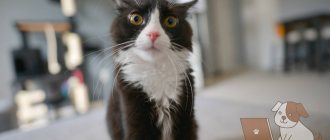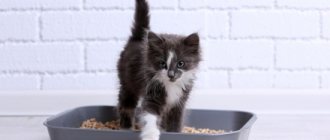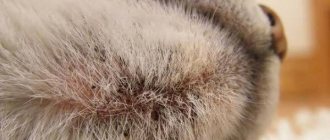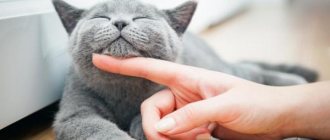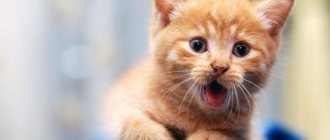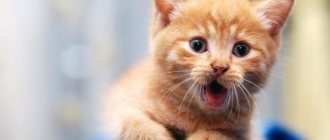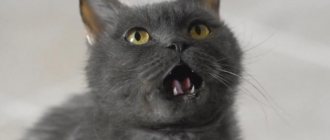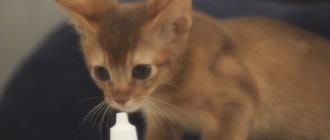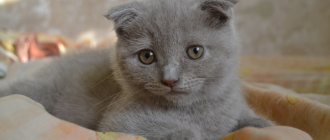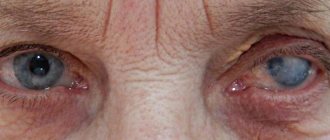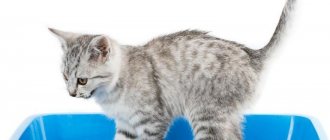We often love our cats so much that we tend to attribute human emotions and actions to them. We are convinced that they can understand how we feel, and we consider our furry friends to be smart, sensitive, cautious, sociable - in general, we endow them with human qualities.
What about physical condition? We know that cats get sick and tired just like humans, but where does the similarity end? For example, in humans, hiccups are common and not cause for concern. What about cats? Kittens suffer from hiccups more often than adults, but just like people, it can happen at any age and at any time.
What is hiccups
Hiccups are a nonspecific disorder of external respiration.
It occurs as a result of mechanical irritation of the vagus nerve (passes through the chest and diaphragm to the stomach and abdominal organs, connects internal organs with the central nervous system) and reflex contraction of the diaphragm. In this case, each breath is interrupted by a sudden closure of the glottis, resulting in a characteristic strangled sound. A cat's attack may occur suddenly, for no apparent reason. It all goes away as involuntarily as it began. In healthy adult cats, hiccups are a reaction to discomfort in the stomach or intestines and are harmless and short-term in nature. Does not pose a threat to health. Kittens begin to hiccup in the womb. This phenomenon is considered physiologically necessary for the development of babies’ lungs, training the diaphragm, and preparing for independent breathing.
Kittens often hiccup due to hypothermia, since their thermoregulation is not well developed. Why do cats that are pregnant with kittens hiccup? An enlarged uterus causes a displacement of the diaphragm and stomach, which causes periodic irritation of the vagus nerve, so the cat begins to have an attack.
Causes
Both adults and babies can suffer from hiccups. Often a kitten experiences it in the womb, shortly before birth. It is believed that intrauterine hiccups are necessary for the formation of independent breathing and serve to train the diaphragm and respiratory muscles.
In most cases, hiccups for adults are completely harmless. In this case, it is usually episodic in nature and is an unconditioned reflex that occurs as a response to temporary discomfort in the gastrointestinal tract. After the normal state of the gastrointestinal tract is restored, spasms of the diaphragm also disappear.
But if a cat hiccups frequently and for a long time, this may indicate severe internal pathologies. Thus, depending on the causes and provoking factors, several types of hiccups are distinguished:
- idiopathic;
- psychogenic;
- arising as a result of stimulation of the diaphragm and irritation of the vagus nerve;
- pathological
Idiopathic hiccups
It has no apparent cause and goes away on its own. Doctors suggest that initially hiccups were a protective reaction of the body. Idiopathic hiccups are an incompletely extinguished reflex of intrauterine fetal hiccups, necessary for the kitten to learn to breathe on its own.
Psychogenic hiccups
Psychogenic hiccups occur if the pet is depressed or has experienced a nervous shock. The reasons for this may be the following:
- the animal suffers from lack of attention, no one plays with it;
- the cat remains locked alone if the owners are away from home for a long time;
- There is competition between animals for territory or food (if there are two or three cats in the house).
Hiccups caused by stimulation of the diaphragm and irritation of the vagus nerve
If a cat hiccups after eating, this means that its body is trying to restore the function of the pinched vagus nerve. The vagus nerve or vagus nerve is a paired nerve that runs throughout the body, from the head to the abdominal cavity. It innervates the head, neck, organs of the chest cavity, and gastrointestinal tract. Passing through the hole in the diaphragm, it regulates the functions of breathing, swallowing, heartbeat, vomiting, and stomach function.
Under the influence of many factors and as a result of stimulation of the diaphragm, the vagal nerve can be infringed. The mechanism of hiccups, which consists of a sharp contraction of the diaphragmatic muscles and subsequent release of tension, helps relieve the pinching and release it. Situations that contribute to nerve pinching lead to the appearance of hiccups:
- binge eating;
- hasty eating, poor chewing, swallowing food in large pieces;
- eating cold food or water;
- eating dry food in the absence of sufficient liquid;
- severe hypothermia of the animal;
- eating in an awkward position when the esophagus or stomach is bent;
- pregnancy, when an enlarged uterus can put pressure on the diaphragm;
- The molting period is also a provoking factor, since cats, while licking themselves, swallow a large amount of hair.
Pathological hiccups
Pathological hiccups are a symptom of a wide variety of diseases. If it is prolonged and is accompanied by other alarming symptoms, then the cat must be shown to a veterinarian. Otherwise, you may not notice that he is developing a serious illness and waste time. Pathological hiccups may indicate the following diseases:
- Disturbances in the functioning of the central nervous system. If a cat hiccups excessively, experiences nausea, or blurred vision, this may indicate inflammation of the meninges (meningitis, encephalitis) or high intracranial pressure. If coordination of movements is impaired or there is circular walking, then there is a high probability of tumor diseases of the brain.
- Diseases of the gastrointestinal tract. Prolonged, frequently recurring hiccups may indicate gastritis or stomach ulcers, pancreatitis, disease of the gallbladder and biliary tract.
- Diseases of the cardiovascular and respiratory systems. Hiccups can be a symptom of bronchitis, pneumonia, as well as heart attack, stroke or arrhythmia.
- Infectious diseases of various etiologies, helminthiasis. All viral and bacterial infections can cause intoxication of the body and be accompanied by nausea, vomiting or hiccups. Infections with any type of helminths also manifest themselves.
- Prolonged hiccups can be a kind of reflex action. This happens when a foreign body (for example, a fish bone) is stuck in the esophagus and the cat is trying to do everything to free itself from it. In this case, other symptoms are present (difficulty in swallowing and breathing, cough, lacrimation, pain). You should immediately contact a veterinarian, as delay can be life-threatening for the animal.
- An allergic reaction affecting the mucous membrane of the respiratory tract can cause prolonged hiccups, sneezing, coughing, difficulty breathing, suffocation, and others.
Psychogenic hiccups
Sometimes a cat's hiccups are psychosomatic in nature.
Psychogenic hiccups can be caused by:
- changing their usual living environment (the cats gradually get used to the new conditions, calm down, and the hiccups go away);
- severe fear;
- stress associated with the owner’s departure or a change in attitude towards the pet;
- stress caused by the presence of large strangers in the house;
- being in a confined space, alone;
- the arrival of a new pet.
A psychogenic attack does not last long. Spasms of the diaphragm, occurring at a frequency of 2-3 times per minute, gradually fade away. If the owner pays more attention to his beloved cat and gently calms him down, everything will go much faster.
Methods for eliminating hiccups in kittens
“Traditional” methods for eliminating hiccups in kittens: drinking too much, frightening, taking certain positions, physical activity are not suitable, since they create even more stress by forcing the pet to do something it does not want. If the kitten starts hiccupping, just watch him.
The most reliable and safe method for eliminating hiccups is to pick up the kitten and stroke it until it falls asleep.
If the process has exhausted your pet, contact your veterinarian; most often, the problem can be solved with minimal doses of antispasmodics.
Kitten hiccups after eating
Why do cats hiccup after eating? Physiological hiccups occur due to excessive stress on the stomach due to food swallowed in large pieces, overeating, and insufficient water. Haste while eating is harmful. It’s bad when a cat is hungry for a long time or when other animals are in charge of the house and are used to competing for food. It is dangerous if a piece of food gets stuck in the throat or esophagus. If, after eating, a cat hiccups, wheezes while breathing, or experiences increased anxiety, emergency veterinary attention is needed.
There should always be a bowl of clean, cool water in front of the cat. This is especially important if you feed your pet dry food. Food should be given often, but in small portions. The cat's stomach does not digest cold or too hot food well. Food should be warm or at room temperature. Meat and vegetables - soft, chopped as small as possible.
It’s bad if the feeding utensils are positioned incorrectly. The poor cat is in an unnatural position. The esophagus and stomach are bent. Food arrives unevenly, with a lot of air. While eating, the cat should not be nervous or distracted by extraneous factors. If your pets cannot easily share food, feed them all separately at different times.
Why
There may be several reasons, and now we will analyze them in detail.
The cat overate
Responsibility for dosing the food always lies with the owner, since he is the one responsible for the food. Pets often like to eat all the food left in the bowl.
Therefore, never refill it after emptying it.
It's best to set aside specific hours to fill your bowl. In this case, the pet will eat in portions and will not overeat.
Binge eating
Empty bowl of water
If your pet has a lack of fluid in the body, hiccups may indicate this. This is dangerous because a lack of water can lead to serious digestive disorders and constipation.
Always fill the bowl with water.
Don't forget to wash it, as some cats simply refuse to drink water from a dirty bowl.
Eats food too quickly
For this reason, hiccups may also appear. Even veterinarians cannot understand the exact reason for this phenomenon. But veterinarians know for sure that eating quickly is not the norm for cats, so eating quickly has a negative impact on the gastrointestinal tract.
Wool in the esophagus
Some of the wool gets into the stomach and dissolves, but not all of it. And the hair can form into clumps, which further provoke hiccups. Try to brush your pet regularly, and then a huge amount of fur from your fluffy will not get into the stomach.
Wool in the esophagus
In pregnant cats
Occurs regularly in pregnant cats; this is due to the fact that the stomach and diaphragm are displaced. This is why the vagus nerve is irritated, resulting in hiccups. It lasts from 1 minute to half an hour.
Inconvenient bowl
If you changed your cat's bowl and after that she started hiccupping, then you can immediately understand what's wrong. Pets usually eat in one position, and the esophagus is usually fine. But if the bowl is much higher than the previous one, then the esophagus is stretched, and this irritates the vagus nerve.
How to help a cat
A hiccupping cat gets nervous, begins to rush around the house, and suddenly changes its position. To help quickly cope with the attack, she needs to be calmed down. Play with your favorite pet and cuddle it. Offer a new toy. Play is always a good option, especially for a small kitten. A sudden change in activity with a change in breathing rhythm helps eliminate the problem.
Try giving your cat clean, lukewarm water. But you can’t scare people, as people are advised to do (when frightened, a hiccupping person takes a frantic breath of air and soon everything goes away). On the contrary, try to provide him with complete peace. On the contrary, try to provide him with complete peace. Show affectionate care. The pet will be distracted and calm down. Breathing will return to normal. This will help you overcome hiccups faster.
Hairballs that get into your cat's gastrointestinal tract and interfere with normal digestion can also irritate the vagus nerve and cause hiccups. This problem is especially relevant during molting. When a cat sheds, the owner should comb the fur especially diligently and carefully.
Physiology of hiccups and causes of its occurrence
From a physiological point of view, hiccups are a breathing disorder caused by convulsive contraction of the diaphragm. It manifests itself in the form of sharp contractions of the intercostal muscles, which, in essence, are inhalation. A sharp breath taken in this way is interrupted by the closure of the epiglottis and results in a characteristic sound. It should be noted that hiccups are not just a human or feline phenomenon, and that all mammals, without exception, are susceptible to it. It would also not be superfluous to mention that no one has yet found the exact reasons that cause hiccups.
Should you ignore cat hiccups?
The only thing that has been definitely established is that hiccups can be caused by a certain combination of various circumstances. It has also been found that if these root causes are eliminated, the hiccups go away very quickly. Periodic bouts of hiccups are quite normal for any mammal, including cats, but if they become too long or are repeated too often, then this is a clear signal to suspect something is wrong.
As already mentioned, the exact causes of hiccups are not yet known, nor is the complete list of these problems known. However, the most common among them are the following:
How to get rid of a cat from hiccups?
Excessive eating or drinking too much. Since in both cases the stomach is overstretched, this leads to irritation of the nerve endings and, as a result, spasms of the diaphragm. Fortunately, cats are much less likely than humans to overeat or drink too much, and therefore suffer from hiccups much less often.
Hypothermia. As a reflex response to hypothermia, the body provokes trembling. Sharp muscle spasms increase body temperature and help the body warm up somewhat, and one of the forms of such “shivering” is hiccups. Irritation of the vagus nerve. The cause of such irritation can be either air entering the stomach, food that is too dry, swallowing too large pieces of unchewed food (however, in the human understanding of this word, cats do not know how to chew) or an unnatural posture. All this can lead to irritation of the vagus nerve. This nerve passes through the diaphragm and runs parallel to the esophagus.
Causes of cat hiccups.
By the way, it should be noted, so to speak, in order to increase erudition, that initially hiccups are training the muscles of unborn kittens and preparing the lungs for opening. About a week or two before giving birth, a pregnant cat begins to feel the embryos twitching, which indicates that the kittens are ready to open their lungs, even if they are born earlier than expected.
Pathological hiccups
If your cat does not stop hiccupping during the day, experiences severe discomfort, and spasms last 7-10 minutes, you should be wary. Prolonged hiccups are the first symptom of a serious illness, and the range of possible pathologies is extensive, from pneumonia and problems with the cardiovascular system, to encephalitis and parasitic infestation. It happens that a cat suffers from allergies that affect the mucous membrane of the respiratory tract. Allergic hiccups are accompanied by lacrimation, difficulty breathing, frequent sneezing, and coughing.
Signs of concern:
- lack of coordination of movement, the cat staggers, walks in circles;
- anxiety, irritability, lethargy, change in habitual behavior, refusal to eat a favorite treat;
- hiccups are accompanied by nausea and bouts of vomiting;
- the cat wheezes and breathes heavily;
- The cat has urinary incontinence and there is blood in the stool.
For debilitating hiccups, contact your veterinarian. And as soon as possible. Do not self-medicate. Don't waste precious time. Only a veterinarian, after a comprehensive examination, will determine the cause of the pathology and prescribe treatment.
Why does a cat hiccup and what should the owner do?
Hiccups in cats are a symptom of uncontrolled spasms of the diaphragm (the muscle that separates the chest area from the abdominal area). Its convulsive contraction causes forced breathing in the animal. On inhalation, a reflexive closure of the slit occurs and the airways are blocked by the epiglottis (subpharyngeal cartilage), which is accompanied by a characteristic sound.
In fact, hiccups are short-term suffocation. The reasons for this phenomenon may be different. And, depending on them, diaphragm spasm can be either a normal physiological phenomenon or a pathology. From this article you will learn about why this happens, how dangerous it is, what to do so that the attacks stop and do not return.
Treatment and prevention of hiccups
If hiccups are episodic and not a symptom of serious illness, then treatment will not be required. To quickly stop the attack, you can use distracting measures:
- calm the pet, caress it;
- give the animal water to drink;
- keep yourself busy with an interesting game;
- warm if the cat is hypothermic.
If your pet begins to hiccup after eating, it is recommended to pay attention to the following points:
- cat food and water should only be at room temperature;
- The animal should be fed only crushed food;
- the cat should always have free access to clean water;
- meals should take place in a friendly, calm environment;
- the animal should not be overfed;
- a cat, and especially a kitten, should not be allowed to become hypothermic;
In addition, you should promptly comb out a cat that sheds, especially if it is a long-haired breed.
If the hiccups are prolonged and accompanied by other suspicious symptoms, it is necessary to urgently take the cat to a veterinary clinic to exclude serious pathologies.
If the disease is diagnosed, the doctor will prescribe a course of treatment. Once the animal begins to feel better, hiccups can also be easily dealt with since the cause has been eliminated.
